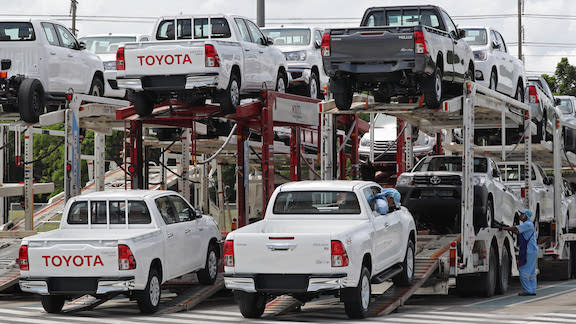Trump set to announce deferral for some tariff payments
President Donald Trump approved a proposal pushed for by some businesses to delay payment of certain tariffs by three months, according to people familiar with the matter.
The announcement to defer levies for so-called most-favored nation duties will come in the form of an executive order, one of the people said. The order, which could come as soon as this week, would give the Treasury Department the authority to direct Customs and Border Protection to delay collecting tariffs on those imports for 90 days.
The order wouldn’t apply to tariffs Trump imposed as a result of an enforcement action, such as on Chinese goods or steel and aluminum from around the world.
A White House spokesman declined to comment. Later Tuesday in an answer to a question about tariff delays at a press briefing on the coronavirus, Trump refuted that he had approved the proposal saying he “didn’t do anything about tariff payments.”
“China is paying us,” Trump said. “I spoke with President Xi and he didn’t mention that. We didn’t mention that. We had a great conversation by the way, a really productive conversation.”
Tariff Scope
The tariff deferrals expected to be announced don’t apply to Chinese goods, they would apply to the most-favored nation tariffs, which are imposed on a non-discriminatory basis to countries exporting certain products to the U.S. such as footwear and apparel. The duties on items such as ski jackets, baby garments, and tennis shoes can range from about 27% to more than 60%, according to the American Apparel and Footwear Association.
The duty deferral would also apply to a 25% tariff the U.S. charges on imported light trucks—dubbed the “chicken tax” that has been in place since the 1960s—which Trump has touted as a reason for that industry’s success.

Bloomberg News last week reported on the proposal, which was drafted by the customs agency. The original had a bigger scope of tariffs that would have been subject to deferral but that was subsequently narrowed.
Companies that import goods pushed for temporary relief from the duty payments as the economic impact of the coronavirus outbreak caused cash flow issues for many.
The proposal sparked immediate push back from domestic industry associations and unions like the United Steelworkers as well as from some people inside the White House.
The president has consistently dismissed calls for tariff cuts and said China hadn’t asked him to remove duties even as a growing number of U.S. businesses and lawmakers called on him to approve a delay.
Similar Stories
United States and Norway issue innovative report creating greater transparency in critical mineral supply chains
Today, the U.S. Department of Commerce and the Norwegian Ministry of Trade, Industry, and Fisheries issued a thorough, innovative report presenting our shared understanding of non-market policies and practices (NMPPs)…
View ArticleDecember CNBC/NRF retail monitor results show strong growth boosted by final Thanksgiving weekend days
Retail sales jumped strongly in December, boosted in part by two busy holiday shopping days during Thanksgiving weekend falling in the final month of the year, according to the CNBC/NRF…
View ArticleNAW presents Dirk Van Dongen Lifetime Achievement Award to Bergman, CEO of Henry Schein, Inc.
At the 2025 NAW Executive Summit Gala on January 28 in Washington, D.C.
View Article
St. Louis region’s chemical industry welcomes new investment
View Article
Navigating compliance: Adapting to changing Customs regulations in global supply chains
View Article
December 2024 U.S. Transportation Sector Unemployment (4.3%) Was the Same As the December 2023 Level (4.3%) And Above the Pre-Pandemic December 2019 Level (2.8%)
View ArticleGet the most up-to-date trending news!
SubscribeIndustry updates and weekly newsletter direct to your inbox!





